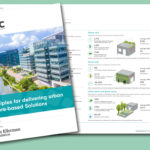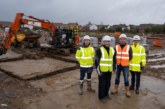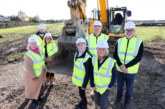The UK Green Building Council (UKGBC) has published its ‘Principles for delivering urban Nature-based Solutions’ (NBS), to help developers and owners increase the incorporation of NBS within the construction and operation of built assets.
The development and function of the built environment has significant impacts upon both climate and biodiversity, locally and globally, and the pressure for our industry to be part of the solution is accelerating. The recommendations of the Taskforce for Climate-related Financial Disclosure (TCFD) have led to a growing requirement to measure and mitigate the physical risks to built assets from climate change, such as flooding and overheating. The forthcoming Environment Bill will legislate for biodiversity net gain on new developments, while communities within our towns and cities are requesting more green space and nature, driven in part by the effects of COVID-19. Urban nature-based solutions can provide an answer to these demands from finance, business, regulators, and communities, and this is recognised within the themes of this November’s international climate conference, COP26.
The purpose of UKGBC’s latest report is to provide a concise overview of practical methods and best practice examples that empower influencers and decision-makers within built environment organisations to increase the use of urban NBS as a means of ensuring climate resilience and enhancing nature. The report sets out six ‘principles’ for delivering urban NBS, ranging from strategic inception to considerations of physical and financial risk assessment, short-term funding, long-term management and future research and innovation needs. Each principle takes a holistic approach to enhancing NBS, to drive its consideration both conceptually and practically, and across both new and existing development contexts.
The ‘Principles for delivering urban NBS’ has been developed collaboratively via an extensive engagement campaign coordinated by UKGBC, which engaged over 90 industry stakeholders across a 12-month period. All of this work has been made possible thanks to the generous support of the John Ellerman Foundation and the time of our members.
Alastair Mant, Director of Business Transformation at UKGBC said: “Nature has a central role to play in our response to climate risks and the ecological crisis. It provides services which protect our urban environments from the physical and financial risks of climate change, whilst making space for the plants and animals that enrich our lives. Furthermore, over the last 12 months, it has become acutely apparent that nature and green spaces can improve human health and generate social value.”
“Property and construction professionals have a critical role in ensuring a positive symbiotic relationship between our natural and built environments. Through the application of the six principles outlined in this report, UKGBC is encouraging the industry to enhance the incorporation of NBS within their operations, and accelerate action to deliver greener, healthier and more resilient places.”
Tom Butcher, Head of Industry Consultancy, Met Office said: “With UK climate projections highlighting extremes of temperature and rainfall, these are impacts which are likely to be felt most acutely in the built environment, as these areas concentrate the effects of climate change through urban heat islands and heavily modified drainage systems and water courses. These factors place increasingly severe stresses on local communities and infrastructure.”
“This report shows the value of working with nature as a key ally, helping to address both parts of the climate challenge by: reducing emissions from the built environment; increasing the resilience of infrastructure; and improving the quality of life and environment for local communities.”
Mathew Frith, Director of Conservation, London Wildlife Trust commented: “We welcome this report; it sets out an ambitious scope of principles to help embed nature-based solutions in the design and management of new buildings and regeneration in our towns and cities.
“The growing urgency of needing to address the intertwined emergencies of the climate and nature crises, and the expectations for the forthcoming COP15 and COP26 summits, places the UK construction and building sector into a pole position of delivering innovative solutions that are good for people, help us adapt to a changing climate and secure sustained gains for nature.”
Helen Drury, Sustainability Lead, Tritax Management LLP said: “At Tritax Big Box REIT we have put nature-based solutions at the heart of our ambitions to tackle the impacts of climate change, create biodiversity net gain, and generate social value. The principles, methods, and case studies in this new UKGBC report will help us inform internal and external stakeholders of the importance and possibilities for integrating NBS into our new and existing assets. I encourage all professionals to access the report as it provides actionable information on several emerging areas of importance for NBS, including measurement, innovative financing, and how to maximise functionality.”









